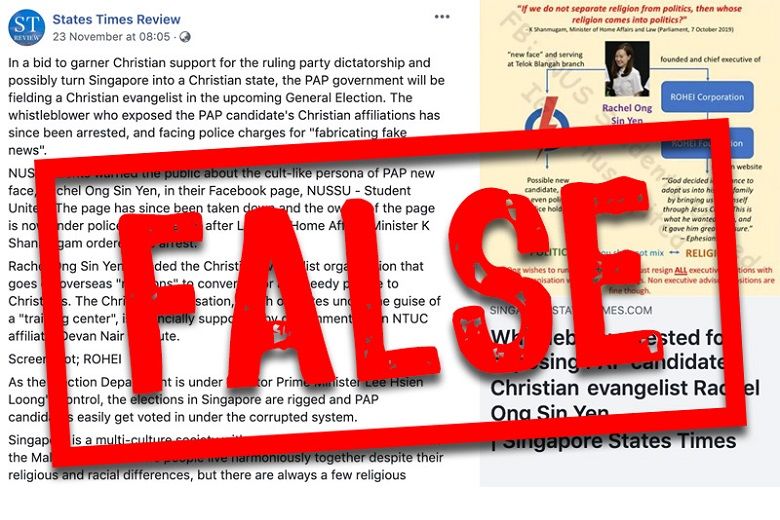States Times Review editor refuses to obey correction order under fake news law
32-year-old, who says he is no longer a S'porean, is second person to get order under Pofma over claims on Facebook
Sign up now: Get ST's newsletters delivered to your inbox

A screenshot of the corrections and clarifications regarding falsehoods posted by States Times Review on Facebook.
PHOTO: GOV.SG
The second person to receive a correction order under Singapore's fake news law has refused to put up a correction note alongside the false statements he made on Facebook, saying he is no longer a Singaporean.
Mr Alex Tan Zhi Xiang, 32, who runs the States Times Review (STR) Facebook page, said in a post yesterday: "States Times Review and it's (sic) editor, who is now a citizen of Australia, will not comply with any order from a foreign government like North Korea or Singapore."
He was issued a correction direction under the Protection from Online Falsehoods and Manipulation Act (Pofma) yesterday, the second time the law has been invoked since it took effect on Oct 2.
The first time was on Monday, when Progress Singapore Party member Brad Bowyer was directed to put up a correction over his Facebook post on Temasek and GIC as well as other government-linked companies.
In Mr Tan's case, the Ministry of Home Affairs (MHA) said he had made "false and baseless" claims in a Nov 23 post on the STR Facebook page.
Among his claims was that one person had been arrested by the police, and another is being investigated, for revealing the religious affiliation of a People's Action Party member in a Nov 17 post on the "NUSSU - NUS Students United" (NSU) Facebook page, which has since been taken down by Facebook.
Refuting this, the MHA said no one had been arrested or charged over the NSU post.
NSU, which spoofs the National University of Singapore Students' Union, commonly known as Nussu, had questioned the suitability of PAP member Rachel Ong as an election candidate, citing her religious affiliation.
In doing so, it misquoted Home Affairs and Law Minister K. Shanmugam and gave a wrong impression of what he said about religion and politics in Parliament.
Subsequently, on Saturday, the NSU page was taken down by Facebook for violating authenticity policies.

In an update to his post yesterday, Mr Tan said: "The Singapore government claimed that no arrest was made. This runs in contrary to the tip-off we received."
Besides referring to the NSU episode in his post, Mr Tan had also made the accusation that Singapore's elections are rigged.
The MHA, describing these allegations as "scurrilous" and "absurd", said: "Singapore's electoral system enjoys high public trust. Elections are held regularly and contested. The electoral system and its procedures are clearly spelt out in law, and apply to all political participants, regardless of affiliation."
The MHA added that during elections, there are equal opportunities for all political participants to observe and monitor the election process.
It said Mr Tan is a Singaporean who is not in Singapore and is the editor of websites such as "Temasek Review News" and "Singapore Herald", which have breached the Infocomm Media Development Authority's (IMDA) Internet Code of Practice on the grounds of public interest.
The ministry also said these sites have been blocked previously and "have perpetuated outright fabrications, such as misrepresenting Singapore's position in foreign relations with other countries and casting aspersions on the integrity of public institutions".
The Straits Times has contacted the Australian High Commission here over Mr Tan's citizenship.
Pofma is not limited to only Singaporeans who post falsehoods.
Legal experts interviewed by The Straits Times said that what matters is whether the statement is "made available to one or more end users in Singapore on or through the Internet".
Singapore Management University assistant professor of law Benjamin Joshua Ong said that according to Section 15(1) of Pofma, failure to comply with a correction direction without a reasonable excuse is an offence, regardless of the person's nationality or whether he is in or outside Singapore.
But he added that in general, Singapore is not able to enforce its criminal law overseas. This means that as long as Mr Tan remains overseas, he is likely to escape prosecution for the offence of not complying with the direction.
But Mr Ong noted that Pofma also provides other remedies for the Government to deal with the STR post.
These include issuing a targeted correction direction or disabling direction to Facebook, which would require the social media company to put up a correction statement on the post or block the post from being accessed.
The IMDA can also order Internet service providers to disable access to the STR website.


